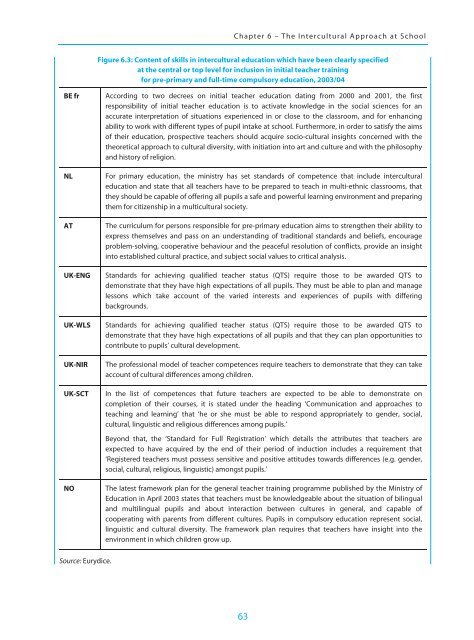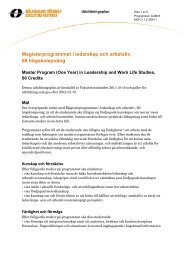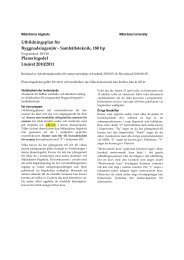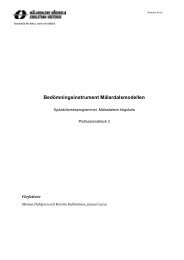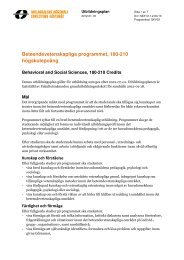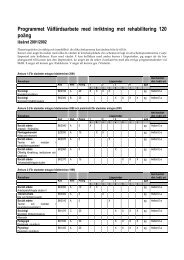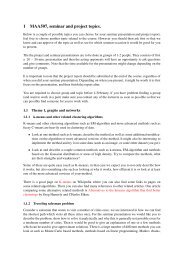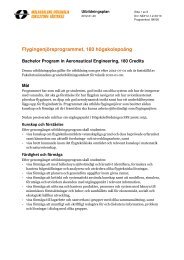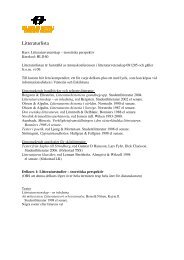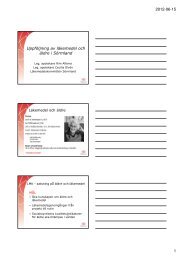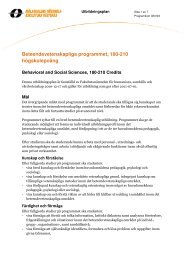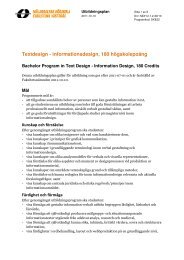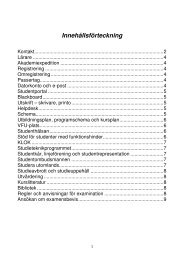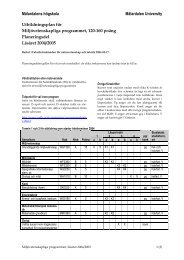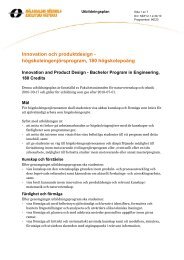Chapter 6 – The Intercultural Approach at SchoolFigure 6.3: Content of skills <strong>in</strong> <strong>in</strong>tercultural education which have been clearly specifiedat the central or top level for <strong>in</strong>clusion <strong>in</strong> <strong>in</strong>itial teacher tra<strong>in</strong><strong>in</strong>gfor pre-primary and full-time compulsory education, 2003/04BE frNLATUK-ENGUK-WLSUK-NIRUK-SCTNOAccord<strong>in</strong>g to two decrees on <strong>in</strong>itial teacher education dat<strong>in</strong>g from 2000 and 2001, the firstresponsibility of <strong>in</strong>itial teacher education is to activate knowledge <strong>in</strong> the social sciences for anaccurate <strong>in</strong>terpretation of situations experienced <strong>in</strong> or close to the classroom, and for enhanc<strong>in</strong>gability to work with different types of pupil <strong>in</strong>take at school. Furthermore, <strong>in</strong> order to satisfy the aimsof their education, prospective teachers should acquire socio-cultural <strong>in</strong>sights concerned with thetheoretical approach to cultural diversity, with <strong>in</strong>itiation <strong><strong>in</strong>to</strong> art and culture and with the philosophyand history of religion.For primary education, the m<strong>in</strong>istry has set standards of competence that <strong>in</strong>clude <strong>in</strong>terculturaleducation and state that all teachers have to be prepared to teach <strong>in</strong> multi-ethnic classrooms, thatthey should be capable of offer<strong>in</strong>g all pupils a safe and powerful learn<strong>in</strong>g environment and prepar<strong>in</strong>gthem for citizenship <strong>in</strong> a multicultural society.The curriculum for persons responsible for pre-primary education aims to strengthen their ability toexpress themselves and pass on an understand<strong>in</strong>g of traditional standards and beliefs, encourageproblem-solv<strong>in</strong>g, cooperative behaviour and the peaceful resolution of conflicts, provide an <strong>in</strong>sight<strong><strong>in</strong>to</strong> established cultural practice, and subject social values to critical analysis.Standards for achiev<strong>in</strong>g qualified teacher status (QTS) require those to be awarded QTS todemonstrate that they have high expectations of all pupils. They must be able to plan and managelessons which take account of the varied <strong>in</strong>terests and experiences of pupils with differ<strong>in</strong>gbackgrounds.Standards for achiev<strong>in</strong>g qualified teacher status (QTS) require those to be awarded QTS todemonstrate that they have high expectations of all pupils and that they can plan opportunities tocontribute to pupils’ cultural development.The professional model of teacher competences require teachers to demonstrate that they can takeaccount of cultural differences among children.In the list of competences that future teachers are expected to be able to demonstrate oncompletion of their courses, it is stated under the head<strong>in</strong>g ‘Communication and approaches toteach<strong>in</strong>g and learn<strong>in</strong>g’ that ‘he or she must be able to respond appropriately to gender, social,cultural, l<strong>in</strong>guistic and religious differences among pupils.’Beyond that, the ‘Standard for Full Registration’ which details the attributes that teachers areexpected to have acquired by the end of their period of <strong>in</strong>duction <strong>in</strong>cludes a requirement that‘Registered teachers must possess sensitive and positive attitudes towards differences (e.g. gender,social, cultural, religious, l<strong>in</strong>guistic) amongst pupils.’The latest framework plan for the general teacher tra<strong>in</strong><strong>in</strong>g programme published by the M<strong>in</strong>istry ofEducation <strong>in</strong> April 2003 states that teachers must be knowledgeable about the situation of bil<strong>in</strong>gualand multil<strong>in</strong>gual pupils and about <strong>in</strong>teraction between cultures <strong>in</strong> general, and capable ofcooperat<strong>in</strong>g with parents from different cultures. Pupils <strong>in</strong> compulsory education represent social,l<strong>in</strong>guistic and cultural diversity. The framework plan requires that teachers have <strong>in</strong>sight <strong><strong>in</strong>to</strong> theenvironment <strong>in</strong> which children grow up.Source: Eurydice.63
<strong>Integrat<strong>in</strong>g</strong> <strong>Immigrant</strong> <strong>Children</strong> <strong><strong>in</strong>to</strong> <strong>Schools</strong> <strong>in</strong> <strong>Europe</strong>Yet <strong>in</strong> around 10 countries, the framework def<strong>in</strong>ed at national level does not <strong>in</strong> general govern the way <strong>in</strong>which <strong>in</strong>stitutions for teacher education really regard their own provision for <strong>in</strong>tercultural education. Thetwo most commonly adopted practices are the development of an <strong>in</strong>tercultural approach via certa<strong>in</strong>subjects, and tra<strong>in</strong><strong>in</strong>g specifically for <strong>in</strong>tercultural education.The first practice is characteristic of certa<strong>in</strong> <strong>in</strong>stitutions <strong>in</strong> the German-speak<strong>in</strong>g Community of Belgium,Germany, Ireland, Latvia, Malta, Slovenia, Slovakia, Norway or Romania. The subjects <strong>in</strong>clud<strong>in</strong>g elementsof education for an <strong>in</strong>tercultural approach are <strong>in</strong> most cases the language of <strong>in</strong>struction, foreignlanguages, geography, history and religious education. In Norway, these subjects are governed by theframework plan for teacher tra<strong>in</strong><strong>in</strong>g. In Latvia, teachers of ethics and social sciences play an important role<strong>in</strong> <strong>in</strong>tercultural education <strong>in</strong> compulsory education.Special modules <strong>in</strong>tended to tra<strong>in</strong> teachers for an <strong>in</strong>tercultural approach exist for example <strong>in</strong> certa<strong>in</strong>tra<strong>in</strong><strong>in</strong>g <strong>in</strong>stitutions <strong>in</strong> France, Ireland, Lithuania, Luxembourg, the Netherlands, Austria, F<strong>in</strong>land, Slovakiaand Iceland. Their content is usually determ<strong>in</strong>ed by the <strong>in</strong>stitutions themselves. In Austria, thegovernment has established the length, optional nature and content of courses on <strong>in</strong>terculturaleducation that are part of teacher tra<strong>in</strong><strong>in</strong>g for pre-primary education.There are thus very few countries that provide <strong>in</strong>stitutions with clear <strong>in</strong>structions as to how curriculashould implement <strong>in</strong>tercultural education. Here and there, support <strong>in</strong>tended directly for those who tra<strong>in</strong>teachers has been <strong>in</strong>troduced.In the Netherlands, the M<strong>in</strong>istry of Education has stated that teacher tra<strong>in</strong><strong>in</strong>g for primary educationshould cover special teach<strong>in</strong>g methods for <strong>in</strong>tercultural education, which are communicated through anetwork of tra<strong>in</strong><strong>in</strong>g <strong>in</strong>stitutions. In the United K<strong>in</strong>gdom (England), the Teacher Tra<strong>in</strong><strong>in</strong>g Agency’slatest annual survey (2003) of newly qualified teachers shows that many of them felt that their <strong>in</strong>itialtra<strong>in</strong><strong>in</strong>g had not properly prepared them for teach<strong>in</strong>g <strong>in</strong> a diverse classroom. In response, the Agency isdevelop<strong>in</strong>g an Initial Teacher Tra<strong>in</strong><strong>in</strong>g Professional Resource Network to identify and spread goodpractice. The Network will also develop exemplification materials on diversity for teacher tra<strong>in</strong>ers. InNorway, various measures have been implemented to enhance the perception of multiculturalism <strong>in</strong><strong>in</strong>stitutions that provide this tra<strong>in</strong><strong>in</strong>g.Cont<strong>in</strong>uous professional development <strong>in</strong> <strong>in</strong>tercultural education, which usually focuses on acquir<strong>in</strong>gcompetence <strong>in</strong> teach<strong>in</strong>g practice or methodology geared to work with pupils from different culturalbackgrounds, exists <strong>in</strong> the great majority of countries. It may be provided by many different players, suchas <strong>in</strong>stitutions for teacher education, teacher associations, m<strong>in</strong>istries of education and <strong>in</strong>-service tra<strong>in</strong><strong>in</strong>gcentres, etc. In most cases, it is optional. In Greece, <strong>in</strong>-service tra<strong>in</strong><strong>in</strong>g is compulsory for teachers <strong>in</strong>schools that have adopted an <strong>in</strong>tercultural curriculum.In Portugal (where there is no centralised directive on the <strong>in</strong>clusion of <strong>in</strong>tercultural education <strong>in</strong> <strong>in</strong>itialteacher education) and <strong>in</strong> F<strong>in</strong>land, guidel<strong>in</strong>es on the development of an <strong>in</strong>tercultural approach have beenset as part of cont<strong>in</strong>uous professional development.The 2001 legislation <strong>in</strong> Portugal on the professional qualifications and background of teachers <strong>in</strong> preprimary,primary and secondary education specifies the skills related to <strong>in</strong>tercultural education thatteachers should acquire <strong>in</strong> the course of lifelong tra<strong>in</strong><strong>in</strong>g if necessary. In F<strong>in</strong>land, the teacher educationprogramme established <strong>in</strong> 2001 by the M<strong>in</strong>istry of Education considers that tra<strong>in</strong><strong>in</strong>g related to l<strong>in</strong>guisticm<strong>in</strong>orities and immigrants is a priority area for cont<strong>in</strong>uous professional development64


